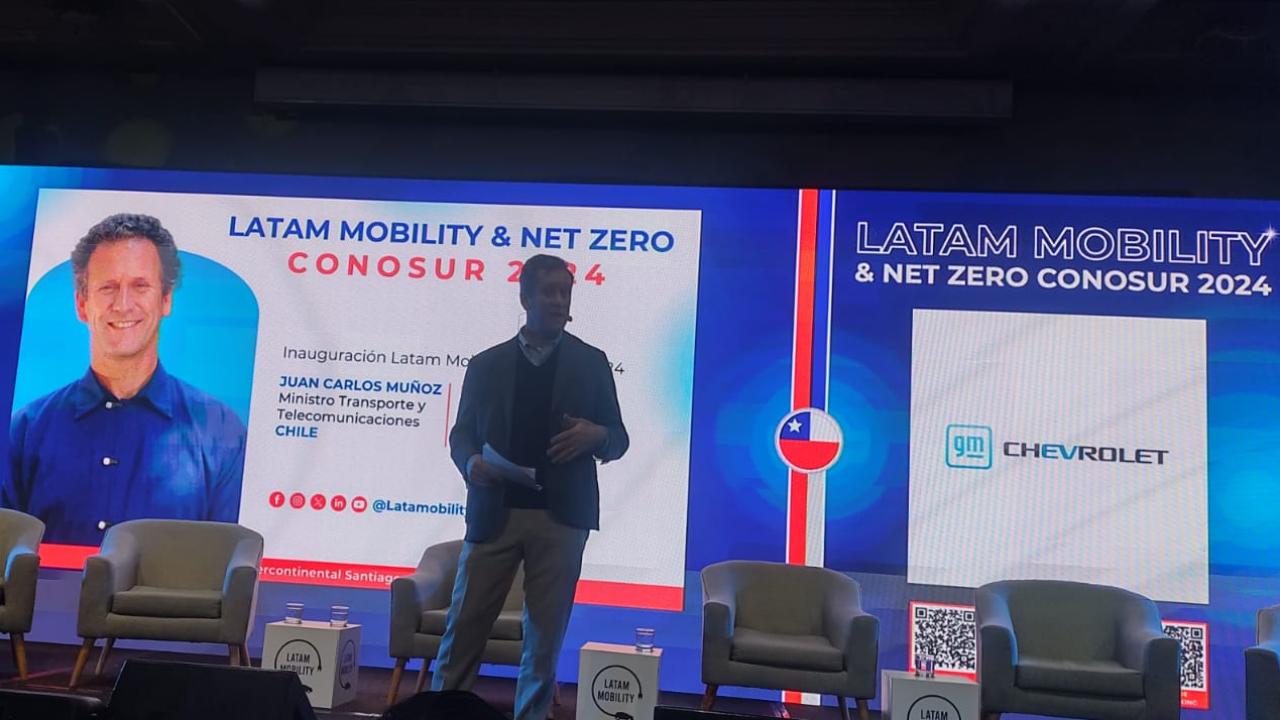
Decarbonization, sustainable mobility, electric vehicles, charging infrastructure technologies and clean fuels were some of the topics discussed at the Latam Mobility event.
"In just over a year of operation, we have identified an exponential increase in trips between 6 and 9 in the morning and then between 6 and 9 at night, with an average distance of 1.6 kilometers. This leads us to believe that users use the service to go to work, get to the subway or avoid a 15-block walk."
The description of the Woosh electric scooter service is made by Bernardo Barros, Operations Manager for Chile of the firm, in a hotel in the capital where suppliers of zero-emission technologies and authorities have met to review the available offer of zero-emission solutions for citizens.
In this context, Barros shared encouraging data on the use of these vehicles in the city, since their arrival in that country, in March 2023. "In 2024, we have made more than a million trips and traveled more than 2 million kilometers," he added.
This success has led Whoosh to expand its operations not only in Santiago, but also in other regions of Chile. "We are expanding our coverage areas in the Metropolitan Region and since January we have had a presence in Temuco. We are happy with the reception of the people and the large number of users who choose Whoosh as their transport for last mile trips," said Barros.
The event is Latam Mobility, where, over two days, the technological changes and regulations necessary to accelerate the implementation of electromobility in the country were discussed.
Chilean Transport Minister Juan Carlos Muñoz opened the debate, outlining the various challenges his portfolio faces in terms of decarbonisation and improvements to the transport ecosystem. Muñoz highlighted the ambitious expansions of the Santiago Metro, including the extensions of lines 2, 3 and 6, as well as the new lines 7, 8 and 9.
However, the minister was emphatic in pointing out that technology alone is not enough. "We have to look for mechanisms to discourage the use of cars," since the exclusive use of electric cars will not end other problems derived from traffic (…) If I get into my truck, alone, I am not going to have to deal with the traffic jam problem. I am the problem," warned Muñoz.
This comprehensive vision of sustainable mobility was supported by Andrés García, director of Latam Mobility, who pointed out that these problems are common throughout the region and emphasized the need to address sustainable mobility from multiple angles.
"Sustainable mobility must be viewed from different perspectives; from the electrification and decarbonization of transport, electromobility, but also through public policies and governance policies such as teleworking or hybrid work, as well as fleet management through technology such as AI, which allows for more efficient routes to be drawn up so that vehicles spend less time on the road network," explained the executive in charge of the event.
MORE CARGO INFRASTRUCTURE
The growth of the sustainable mobility sector in recent years has been remarkable. García estimates that public interest and the offer of solutions have more than doubled since 2019.
In particular, sales of electric vehicles have seen a significant increase. "From 2023 to today, sales have already doubled. And if we look at it from different segments, at least in the hybrid segment, sales have tripled," said García.
This growth is largely due to the diversification of the offering by automotive brands, which now offer a wide range of electric options for different needs and market segments.
The event, however, demonstrated that public and private sector interest in these modes of transport is growing, but infrastructure and investment, as well as comprehensive planning, are required for them to be successful.
"Companies that today offer both electric and electric vehicle offerings, as well as charging infrastructure, software and artificial intelligence for the development and optimization of mobility, are also part of this equation. And the third profile are representatives of associations, trade organizations that also promote and develop the adoption of all these technologies," said García.
Indeed, the expansion of the electric vehicle market has brought with it the need for adequate charging infrastructure. According to data from the second sustainability report for Chile, delivered by EvolvX, the energy resources consultancy of Latam Mobility, by August 2024, Chile has 467 charging stations throughout the country, which translates into 1,400 connection points.
Despite these advances, experts agree that there is still much to be done in terms of public policies, investment and development of new technologies.
"It makes no sense to decarbonize public transport if at the same time we are carbonizing the energy generation matrix; there must also be public policies that allow for better adoption of new technologies, as well as clear rules for those who wish to invest in the sector," García emphasized.
The event also addressed developments in other transport sectors, such as the aeronautical industry and heavy transport, where alternative fuels such as SFA, methane and hydrogen are used.
The Latam Mobility event is part of a series of meetings throughout Latin America. “Our mission is to accelerate the sustainable transition in Latin America and that is why we hold different meetings throughout Latin America, in Colombia, Mexico, Chile and Brazil,” García explained.









